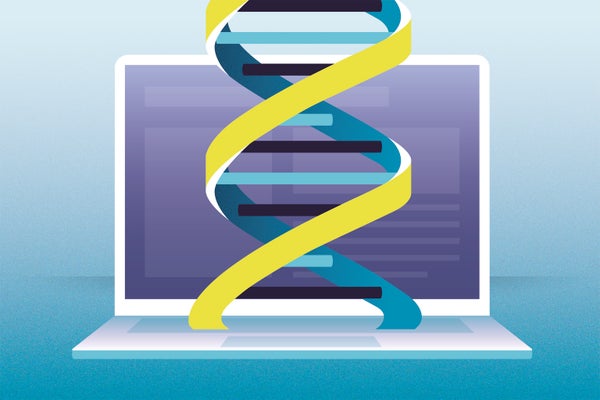Early in the COVID-19 pandemic, scientists in China uploaded the virus's genetic sequence (the blueprint for its production) to genetic databases. A Swiss group then synthesized the entire genome and produced the virus from it—essentially teleporting the virus into their laboratory for study without having to wait for physical samples. Such speed is one example of how whole-genome printing is advancing medicine and other endeavors.
Whole-genome synthesis is an extension of the booming field of synthetic biology. Researchers use software to design genetic sequences that they produce and introduce into a microbe, thereby reprogramming the microbe to do desired work—such as making a new medicine. So far genomes mainly get light edits. But improvements in synthesis technology and software are making it possible to print ever larger swaths of genetic material and to alter genomes more extensively.
Viral genomes, which are tiny, were produced first, starting in 2002 with the poliovirus's roughly 7,500 nucleotides, or code letters. As with the coronavirus, these synthesized viral genomes have helped investigators gain insight into how the associated viruses spread and cause disease. Some are being designed to serve in the production of vaccines and immunotherapies.
On supporting science journalism
If you're enjoying this article, consider supporting our award-winning journalism by subscribing. By purchasing a subscription you are helping to ensure the future of impactful stories about the discoveries and ideas shaping our world today.
Writing genomes that contain millions of nucleotides, as in bacteria and yeast, has become tractable as well. In 2019 a team printed a version of the Escherichia coli genome that made room for codes that could force the bacterium to do scientists' bidding. Another team has produced an initial version of the brewer's yeast genome, which consists of almost 11 million code letters. Genome design and synthesis at this scale will allow microbes to serve as factories for producing not only drugs but any number of substances. They could be engineered to sustainably produce chemicals, fuels and novel construction materials from nonfood biomass or even waste gases such as carbon dioxide.
Many scientists want the ability to write larger genomes, such as those from plants, animals and humans. Getting there requires greater investment in design software (most likely incorporating artificial intelligence) and in faster, cheaper methods for synthesizing and assembling DNA sequences at least millions of nucleotides long. With sufficient funding, the writing of genomes on the billion-nucleotide scale could be a reality before the end of this decade. Investigators have many applications in mind, including the design of plants that resist pathogens and an ultrasafe human cell line—impervious, say, to virus infections, cancer and radiation—that could be the basis for cell-based therapies or for biomanufacturing. The ability to write our own genome will inevitably emerge, enabling doctors to cure many, if not all, genetic diseases.
Of course, whole-genome engineering could be misused, with the chief fear being weaponized pathogens or their toxin-generating components. Scientists and engineers will need to devise a comprehensive biological security filter: a set of existing and novel technologies able to detect and monitor the spread of new threats in real time. Investigators will need to invent testing strategies that can scale rapidly. Critically, governments around the world must cooperate much more than they do now.
The Genome Project-write, a consortium formed in 2016, is positioned to facilitate this safety net. The project includes hundreds of scientists, engineers and ethicists from more than a dozen countries who develop technologies, share best practices, carry out pilot projects, and explore ethical, legal and societal implications.
